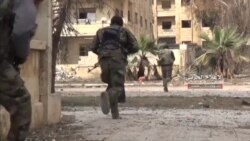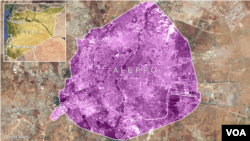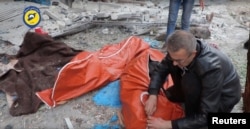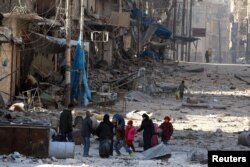The Syrian army's push into rebel-held areas of Aleppo continues, and entire districts of Syria's largest city have been returning to government control for the first time in years.
As Assad's forces backed by their Russian allies pound eastern Aleppo, the human suffering mounts and so do questions about whether this signals the end is near for the six-year-old Syrian insurgence.
Some observers think it does.
"The loss of eastern Aleppo in its entirety would signal the beginning of the end of the rebellion, definitely," said Samir Puri, a lecturer on International Relations at Kings College, London.
Aleppo is the last major foothold, and rebel leaders insist that by retaining control of Idlib province and other parts of Syria the war is not ending anytime soon.
"I think it's still far from that because what's happening in Syria is just another battle in the bigger fight there," said Haid Haid, a Syria researcher and associate fellow at Chatham House.
Loss of credibility
But the loss of Aleppo by the mostly Muslim Sunni rebel groups carries big symbolism, which in war, is important.
"With the fall of Aleppo, the rebellion won't end overnight, but it will be dealt such a significant symbolic blow. This is of course Syria's biggest city. The rebels have held it since 2012 and it's very difficult to imagine how the rebellion would be able to, in the context of peace talks, present themselves as a credible political force without some hold in Aleppo," said Puri, who recently authored the book Fighting and Negotiating with Armed Groups:the Difficulty of Securing Strategic Outcomes.
He said negotiations between Assad and the rebels have never gotten off the ground and getting the actors to the table would now be even harder.
"It will be pointless because the regime, when [Assad] was in a bad position a few years ago, he was not keen to really engage in a meaningful discussion on finding a solution to conflict in Syria. So, imagine right now when the regime has the upper hand and he thinks he is winning the war there," said Haid.
Turning point
Haid, originally from Aleppo, left Syria in 2012 - the year after the rebellion started - thinking that with Washington's support, the rebels would soon overwhelm Assad's forces.
Like other Syrians, Haid said he placed great hope at the time the United States would intervene when President Barack Obama issued a warning to Assad.
"We have been very clear to the Assad regime that a red line for us is we start seeing a whole bunch of chemical weapons moving around or being utilized. That would change my calculus," the U.S. leader said at the White House in August, 2012.
One year later, Assad's army killed more than 1,000 people with sarin gas. Contrary to expectations, the United States did not respond with force, and it was then Haid said the hopes of many were dashed. "That was the turning point in the conflict, because not following through with the threat was a green light for Assad to keep doing what he was doing and the only solution according to him was going to be a military solution."
In his London apartment, Haid awakes each day wondering whether his family members in Aleppo have escaped another night unharmed.
"What has been missing so far is the lack of will of the international community to stand up and do its part," he said.
Change in U.S. policy?
Where the conflict heads now depends on whether regional powers siding with the rebels step up their support, and whether the various rebel factions manage to stop their infighting.
Thus far, there is no sign of the Russians letting up their efforts to keep Assad in power.
More notably, there are big questions on what Donald Trump will do about Syria when he is sworn in as U.S. president next month.
Already, the president-elect has given indications Syria will be high on his foreign policy agenda.Russian Deputy Foreign Minister Mikhail Bogdanov has been quoted by Russian media as saying Moscow diplomats were in contact with Trump on Syria during the campaign.
Before the election, Trump repeatedly said he would cooperate with Russia to fight the Islamic State group.
With Russia showing no signs of letting up the fight on behalf of Assad and the incoming U.S. leadership signaling a larger willingness to work with the Russians to end the Syrian conflict, the rebels appear to have fewer guarantees.








